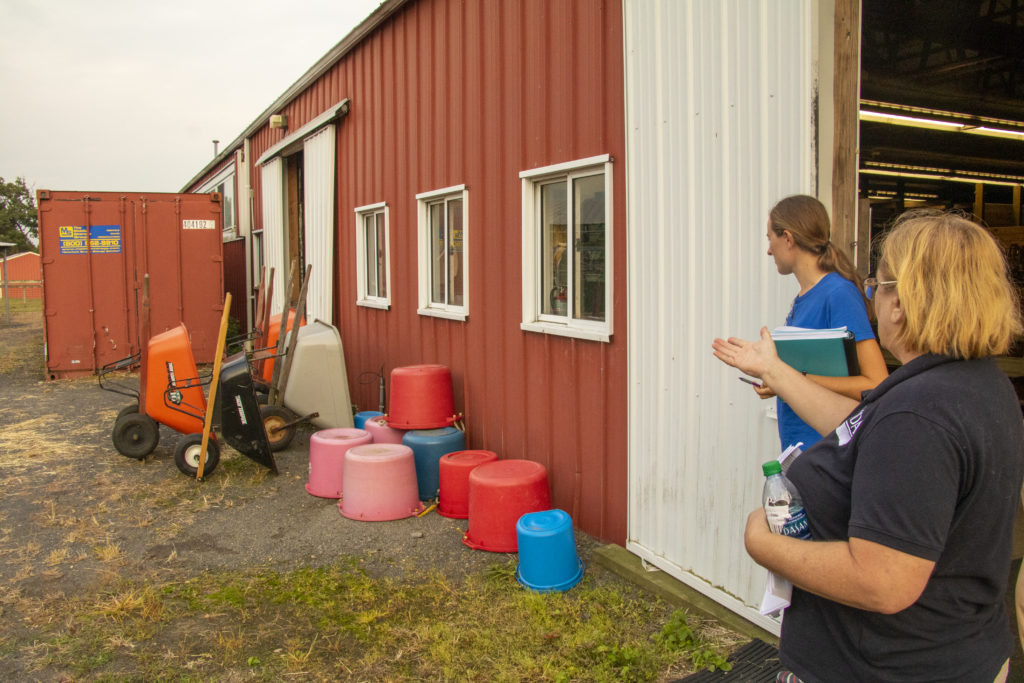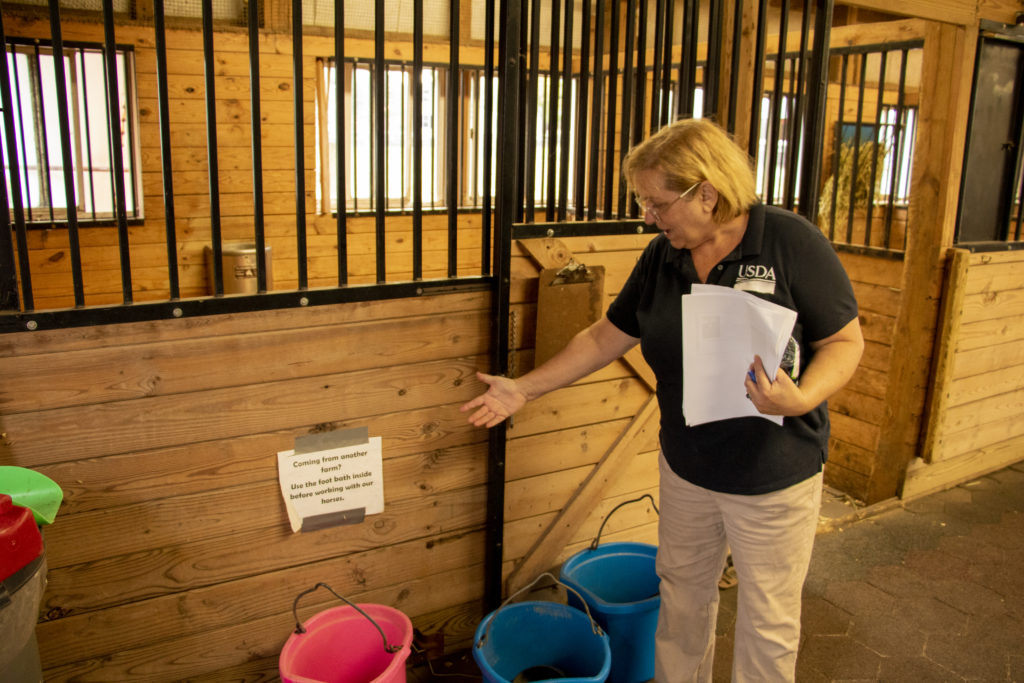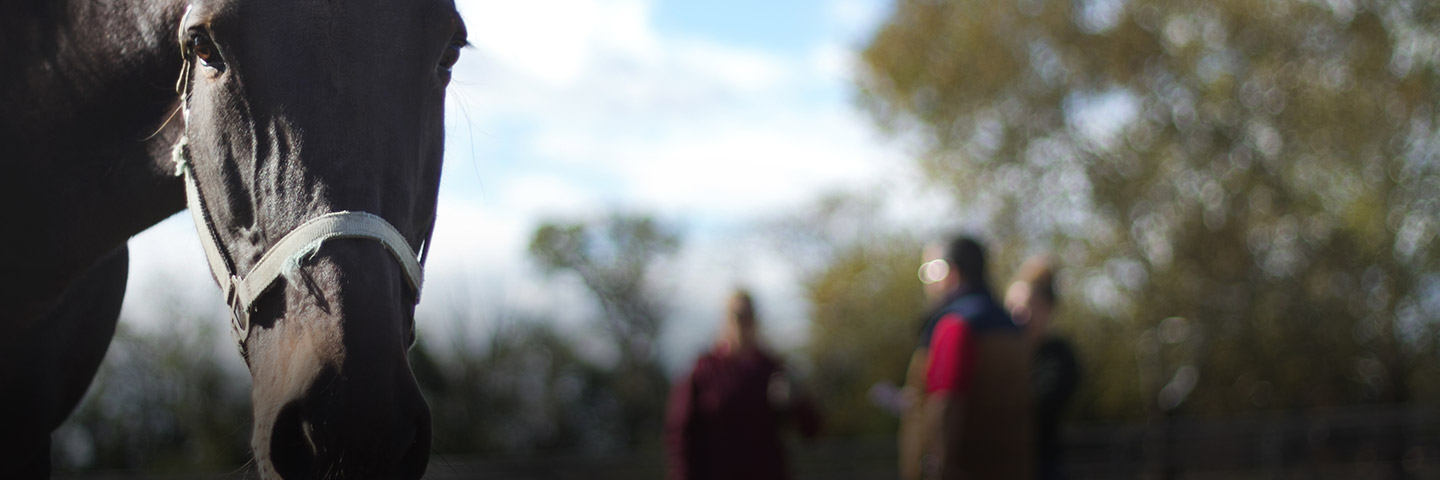Hay Everybody!
In one of my recent blogs a took a look at vaccines and how they work. I had hoped to convince my veterinarian to decrease the number of vaccines and thus, needle pricks I received each year. I discovered instead that it is very important for me to receive all of my vaccinations each year to stay healthy. Along the way I learned biosecurity is also an important part of keeping myself and my horsey friends healthy. I decided I needed to gather more information about biosecurity and so, I set out on another investigative journey.
My search has revealed that biosecurity refers to practices designed to protect your horse or you from harmful biological agents including disease causing agents. Biosecurity can involve a number of different practices and which ones you implement will depend on your horse and its living situation. The goal of all of the practices and your biosecurity plan as a whole should be to prevent your horse from becoming sick.
My investigative research led me to the American Association of Equine Practitioners (AAEP) and the United States Department of Agriculture Animal and Plant Health Inspection Service (USDA/APHIS) which both provide guidelines on equine biosecurity practices. I discovered the first step in any biosecurity plan is to ensure your horse is in good health, overall. This includes providing adequate nutrition and limiting stress in your horse’s life. Vaccination is also a part of keeping your horse healthy (those pesky vaccinations just keep coming up!). Having good rodent and insect control practices in place will also help in keeping your barn and farm a safe place as these critters can spread disease.
I have found biosecurity is extra important when traveling to events like shows where your horse will be exposed to all of the other horses and ponies, which I think is super exciting. So many new friends to meet! All of these other horses, though, can carry diseases and you risk exposing your horse to their germs. How do you protect your horse from all of those germs floating around the showgrounds? You want to make sure you don’t share equipment like halters, brushes, or buckets with other horses. Also, don’t allow your horse to have direct contact with other horses (this would be touching another horse) and avoid allowing your horse to graze in areas where other horses have grazed. Lastly, make sure your horse doesn’t drink out of the same water trough as other horses and don’t stick the hose in your water bucket when filling it. Instead, you can hold the hose over your bucket as it fills.
I have also discovered some tips to protect your horse on its way to and from the show or other events. It is best to trailer your horse with its barn buddies or by itself rather than with strange horses. If you use a trailer that is also used by other horses, you will want to clean and disinfect the trailer in between each use. Once your horse returns home, you’ll want to keep it isolated from other horses for 1-2 weeks. During this time, you should be monitoring the horse for illness, just in case in caught something while it was away from home. This includes taking your horse’s temperature daily (Not my favorite experience!). While your horse is in isolation you should care for it last each day, so you don’t spread germs back to all the other horses. You’ll also want to have a separate set of equipment, things like pitchforks, brushes, and buckets, that you only use for the horse in isolation. I’ve been told separate equipment is important in so many different settings because germs can be carried from horse to horse on the equipment.

If you were to buy or lease a new horse or move your horse to a new location, you would want to keep the horse in quarantine for 30 days. This means housing your horse in a location where it doesn’t have direct contact with other horses. Your horse can’t make new friends as quickly, but it will help protect all the other horses on the property. Using the same procedures, such as caring for the horse last and using separate equipment, you used when your horse was in isolation after travel will help prevent germs from spreading. As you think about which horses should live together, keep in mind it is best to house horses in groups based on the horse’s age and use. This means horses that travel often would live together and separately from the horses that stay at home.
Guess what else I learned? Your horse isn’t the only one who can spread diseases. Their human handlers (that could be you) can also spread germs which cause disease. To minimize this risk, make sure you don’t visit farms where you know there are sick horses. When you do visit other farms or vet clinics, change clothes and footwear and thoroughly wash your hands before saying hello to your horse. Providing a foot bath for any visitors who may arrive at your barn or farm can also decrease the risk of spreading germs from farm to farm. The Equine Science Center has a cool sign you can post to help make visitors aware of your biosecurity protocols. Check it out by visiting https://esc.rutgers.edu/wp-content/uploads/2015/05/BioSecurity-Signs.pdf and make sure you print a copy to post at your barn.

You may think with all these biosecurity practices in place you horse will never, ever get sick. While these practices are important in keeping your horse as healthy as possible, we can never prevent all sickness. If your horse should become sick, you’ll want to contact your veterinarian so he or she can provide care for your horse and help prevent the disease from spreading. As part of this prevention plan, any sick horses will need to be placed in isolation. Once again, this means the horse can’t have any contact with other horses. You’ll want care for the sick horse last and wear different clothes and foot wear when working with the sick horse. A good way to do this is to have a pair of coveralls and boot covers to wear when you’re caring for the sick horse. You’ll also want to wash your hands immediately after any contact with the sick horse and it might also be a good idea to wear disposable gloves. As discussed in the other scenarios, you’ll want to have a separate set of equipment that is used only for the sick horse. Once the horse recovers, the equipment and stall will need to be thoroughly cleaned and disinfected.
Whew, I’ve decided keeping myself healthy is hard work. That’s why I keep all my friends at the Center around. They worry about keeping up with all of these biosecurity practices. That means I just have to keep up with the number of donuts I’ve consumed each week and thinking about what I’m going to investigate in my next adventure. As I’m sure you’ve realized by now, all those donuts keep my brain power on high which allows me to put all of my sleuthing powers to work!
Until next time!
Your Friend,

Lord Nelson

